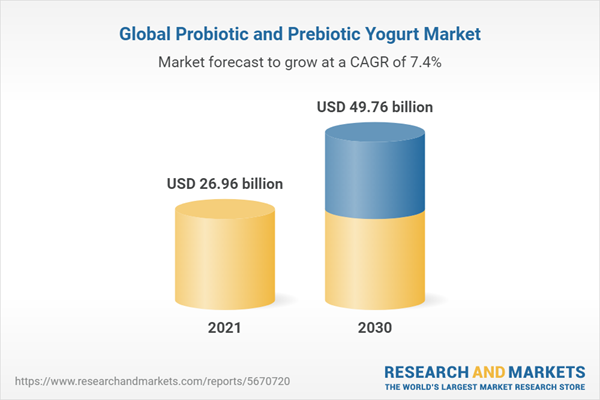Yogurt is a semisolid fermented milk product which is formed from lactic acid producing bacteria; Lactobacillus bulgaricus along with Streptococcus thermophilus. Yogurt consumption constitutes arrays of benefits for the human body. In light of this, the demand for yogurt as a prebiotic and probiotic has been increasing tremendously.
The market for probiotic and prebiotic yogurt is booming owing to the rising yogurt consumption, increasing research indicating the benefits of yogurt, and the rising market players. The positive investigations followed by the companies is an element of substantial importance fueling the growth rate of the industry. For instance, in May 2020, Probi AB ventured into a long-term research and development collaboration agreement with Competence Centre on Health Technologies (CCHT), which aims at developing novel products based on probiotics lactobacilli strains.
In contrary to that, there occurs various challenges in incorporation of prebiotics and probiotics in the different forms. Moreover, the regulatory constraints hamper the growth rate of the market.
Growth Influencers:
Increased Yogurt Consumption
Owing to the high benefits of yogurt, there has been a high demand for flavored as well as plain yogurt in the ndustry. Supermarkets and hypermarkets have started focusing on sales of yogurt all throughout the world. Statistics taken from National Diet and Nutrition Survey states that in the US, 62% of children aged 4-10 years and 31% of children aged 11-18 years were yogurt consumers.In addition to that, according to Indian Council of Medical Research (ICMR), the Institute for Health Metrics and Evaluation, and the Public Health Foundation of India in 2019, 72 million Indians suffered from Type-2 diabetes. Thus, such statistics have generated awareness regarding the benefits of fortified healthy foods such as yogurt in the country.
Positive Investigations for Health Benefits of Pro and Prebiotic Ingredients.
Consumption of yogurt is associated with lower body weight, body mass index (BMI), and research has shown a lower risk of being overweight or obese among adult consumers of yogurt. Moreover, experts have proven that yogurt consumption associates with higher nutrient intake, diet quality, and nutrient adequacy, in children as well as adults. Furthermore, the 2020 Dietary Guidelines Advisory Committee recommended that the intake of added sugars be lowered to 6% of total calories given their impact on health. Thus, with such norms in place, the market for prebiotic and probiotic yogurt is subject to high increase.
Segments Overview:
The global probiotic and prebiotic yogurt market is segmented into type and application.By Type
- Plain Yogurt
- Flavored Yogurt
- Fruited Yogurt
- Others
By Application
- Children
- Adults
- Elderly People
Regional Overview
By region, the global probiotic and prebiotic yogurt market is divided into Europe, North America, Asia Pacific, Middle East & Africa, and South America.The Asia Pacific market for probiotic and prebiotic yogurt held the largest market share of 38.6% in 2021. The APAC market held a revenue of USD 10.40 billion and is estimated to grow the fastest with a growth rate of 8.02% over the forecast period. The European region is anticipated to grow at a steady rate owing to the increasing awareness.
Competitive Landscape
The chief companies operating in the global probiotic and prebiotic yogurt market include Yakult, Nestle, Chobani, Fage, Greek Gods, Dannon, Pillars, among others.The top eight players in the market hold approximately 80% of the market share. These market players are investing in product launches, collaborations, mergers & acquisitions, and expansions to sustain in the market. For instance, in October 2020, Pillars Yogurt, a Boston-based firm, launched 32-ounce multi-serve drinkable Greek yogurt. The line is available in plain, chocolate, mixed berry and raspberry flavors.
The global probiotic and prebiotic yogurt market report provides insights on the below pointers:
- Market Penetration: Provides comprehensive information on the market offered by the prominent players
- Market Development: The report offers detailed information about lucrative emerging markets and analyzes penetration across mature segments of the markets
- Market Diversification: Provides in-depth information about untapped geographies, recent developments, and investments
- Competitive Landscape Assessment: Mergers & acquisitions, certifications, product launches in the global probiotic and prebiotic yogurt market have been provided in this research report. In addition, the report also emphasizes the SWOT analysis of the leading players.
- Product Development & Innovation: The report provides intelligent insights on future technologies, R&D activities, and breakthrough product developments
- Pricing Analysis: Pricing analysis of various metals and other components used in the manufacturing of probiotic and prebiotic yogurt
- Manufacturing Cost Analysis: Cost-share of various components in probiotic and prebiotic yogurt, cost analysis of probiotic and prebiotic yogurt
The global probiotic and prebiotic yogurt market report answers questions such as:
- What is the market size and forecast of the global probiotic and prebiotic yogurt market?
- What are the inhibiting factors and impact of COVID-19 on the global probiotic and prebiotic yogurt market during the assessment period?
- Which are the products/segments/applications/areas to invest in over the assessment period in the global probiotic and prebiotic yogurt market?
- What is the competitive strategic window for opportunities in the global probiotic and prebiotic yogurt market?
- What are the technology trends and regulatory frameworks in the global probiotic and prebiotic yogurt market?
- What is the market share of the leading players in the global probiotic and prebiotic yogurt market?
- What modes and strategic moves are considered favorable for entering the global probiotic and prebiotic yogurt market?
Table of Contents
Companies Mentioned (Partial List)
A selection of companies mentioned in this report includes, but is not limited to:
- Yakul
- Nestle
- Chobani
- Fage
- Greek Gods
- Dannon
- Pillars
Table Information
| Report Attribute | Details |
|---|---|
| No. of Pages | 171 |
| Published | September 2022 |
| Forecast Period | 2021 - 2030 |
| Estimated Market Value ( USD | $ 26.96 billion |
| Forecasted Market Value ( USD | $ 49.76 billion |
| Compound Annual Growth Rate | 7.3% |
| Regions Covered | Global |









